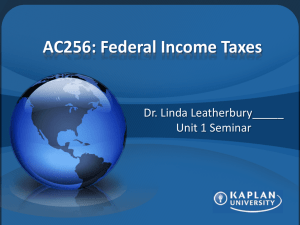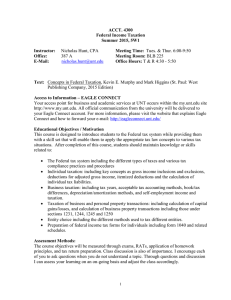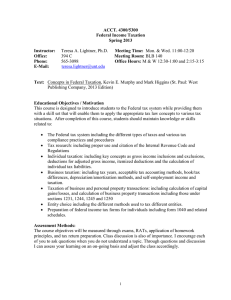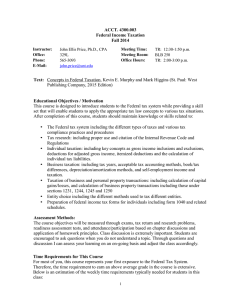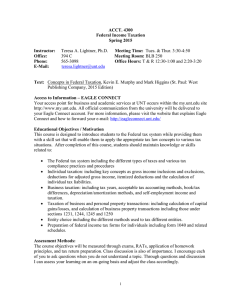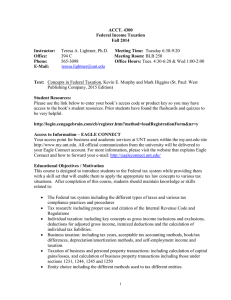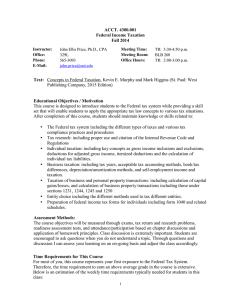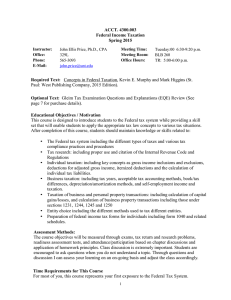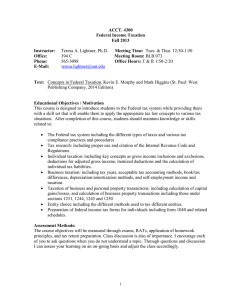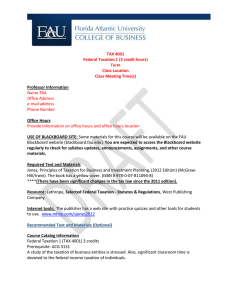ACCT. 4300.002 Federal Income Taxation Fall 2013
advertisement
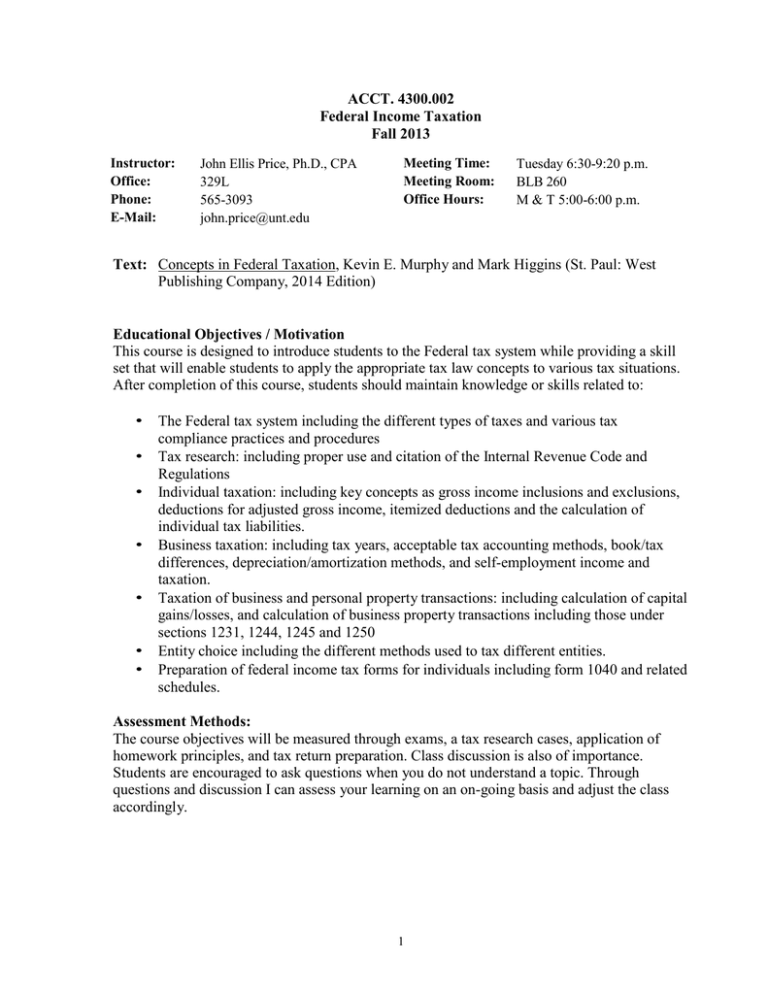
ACCT. 4300.002 Federal Income Taxation Fall 2013 Instructor: Office: Phone: E-Mail: John Ellis Price, Ph.D., CPA 329L 565-3093 john.price@unt.edu Meeting Time: Meeting Room: Office Hours: Tuesday 6:30-9:20 p.m. BLB 260 M & T 5:00-6:00 p.m. Text: Concepts in Federal Taxation, Kevin E. Murphy and Mark Higgins (St. Paul: West Publishing Company, 2014 Edition) Educational Objectives / Motivation This course is designed to introduce students to the Federal tax system while providing a skill set that will enable students to apply the appropriate tax law concepts to various tax situations. After completion of this course, students should maintain knowledge or skills related to: • • • • • • • The Federal tax system including the different types of taxes and various tax compliance practices and procedures Tax research: including proper use and citation of the Internal Revenue Code and Regulations Individual taxation: including key concepts as gross income inclusions and exclusions, deductions for adjusted gross income, itemized deductions and the calculation of individual tax liabilities. Business taxation: including tax years, acceptable tax accounting methods, book/tax differences, depreciation/amortization methods, and self-employment income and taxation. Taxation of business and personal property transactions: including calculation of capital gains/losses, and calculation of business property transactions including those under sections 1231, 1244, 1245 and 1250 Entity choice including the different methods used to tax different entities. Preparation of federal income tax forms for individuals including form 1040 and related schedules. Assessment Methods: The course objectives will be measured through exams, a tax research cases, application of homework principles, and tax return preparation. Class discussion is also of importance. Students are encouraged to ask questions when you do not understand a topic. Through questions and discussion I can assess your learning on an on-going basis and adjust the class accordingly. 1 Time Requirements for This Course For most of you, this course represents your first exposure to the Federal Tax System. Therefore, the time requirement to earn an above average grade in this course is extensive. Below is my estimation of the weekly time requirements typically needed for students in this class: In Class Time: Chapter Reading & Preparation of End of Chapter Questions/Assignments: Other Homework and Semester Projects (spread throughout the semester) 3 Hours 3-8 Hours 2-4 Hours Weekly Estimate of Time for this Class: 8 – 15 hours per week Caveat: Some of you may be able to achieve an outstanding grade with less effort. However, I have found that I prefer to share these estimates up front so students understand my expectations and can adjust to them early in the semester. Exams: Four examinations will be given this semester. The tentative dates for each exam are indicated in the attached class schedule. Class Participation: My objective is to conduct class in a manner that facilitates discussion about the application of tax laws and tax planning. While my responsibility is to "teach" the class, I believe that learning is the responsibility of everyone in the class. It is far easier to learn through active participation, and I expect everyone to contribute to class discussion. I like class discussions to be interactive and informal. My hope is that by each of us contributing to the class discussions, a high level of understanding of the material may be achieved. Homework: The homework assignments listed on the Course Schedule on the back page of the syllabus will not be picked up for a grade. However, the exams will be based on these homework assignments so it is highly recommended that you complete these assignments prior to the second day of the lecture on each chapter. We will go over select problems during the class lectures. Please note that I reserve the right to begin picking up homework assignments for a grade if I feel students are coming to class unprepared. This would result in points being added to the total point structure for the class. I will give one class period notice before implementing such a change. 2 Tax Return and Research Case: One tax return and one tax research case will be assigned during the term. TExpectations and grading criteria for these two assignments will be discussed on the date indicated in class.The tax return project will be prepared manually so that you can see how information flows from one tax schedule to another. Tentative Letter Grade Cutoffs: Grade A B C 100 % - 90% 89.5% - 80% 79.5% - 70% 4 Exams 100 points each Tax Return & Research Case Total Points D F 69.5% - 60% 59.5% & below 400 Points 100 Points 500 Points Academic Dishonesty: The UNT Code of Student Conduct and Discipline provides penalties for misconduct by students, including academic dishonesty. Academic dishonesty includes cheating and plagiarism. The term "cheating" includes, but is not limited to, (1) use or provision of any unauthorized assistance in taking quizzes or examinations or completing tax return assignments; (2) dependence upon the aid of sources beyond those authorized by the instructor in writing papers, preparing reports, solving problems, or carrying out other tax return assignments; or (3) the acquisition, without permission, of tests or other academic material belonging to a faculty member or staff of the university. The term "plagiarism" includes, but is not limited to, the use, by paraphrase or direct quotation, of the published or unpublished work of another person without full and clear acknowledgment. It also includes the unacknowledged use of materials prepared by another person or agency engaged in the selling of term papers or other academic materials. (Source: Code of Conduct and Discipline at the University of North Texas.) Penalties: If you engage in academic dishonesty related to this class, you will receive a failing grade on the test or assignment and a failing grade in the course. In addition, the case will be referred to the Dean of Students for appropriate disciplinary action. Disabling Conditions: The Department of Accounting, in cooperation with the Office of Disability Accommodation, complies with the Americans with Disabilities Act in making reasonable accommodations for qualified students with disabilities. If you have an established disability as defined in the Americans with Disabilities Act and would like to request accommodation, please present your written accommodation request during the first two weeks of classes. My office hours and office number are shown on this syllabus. 3 Religious Holy Days: Any student who is absent from classes for the observance of a religious holy day will be allowed to make-up an examination or complete an assignment scheduled for that day within a reasonable time after the absence. Please check your calendars. Notification must be made in writing and delivered in person no later than the 15th class day of the semester. OTHER ISSUES This is a very important course for accounting majors. This course lays a foundation upon which you will build in the future. There are two keys to doing well in this course: 1) Come to class, pay attention, and ask questions; 2) Complete your homework on a timely basis. If you fall behind, you should meet with me as soon as possible. Recognize that I want you to do well in this course. I believe that the quality of instruction in this course and the fairness of the course grading system provide you with every opportunity to do well . . . if you apply yourself. How to Succeed in ACCT 4300 1. Preparation - Before each class, I will assign you a chapter to read. Be sure to read the assigned material in order to be ready to (a) answer questions posed to the class and (b) ask questions regarding any problems that you may have. Your preparation is a key factor in (a) your performance in this class and (b) how much knowledge you will discern from this class. 2. Preparation - Before each class, you should review your class notes from the previous lecture. This review is an important process in determining your level of understanding of the course material. If you are having problems with materials previously covered in class, it is imperative that we resolve any questions that you have as soon as possible. Do not be leery of asking questions. If you do not understand a point made in class, chances are that your neighbor has a similar lack of understanding. 3. Attend class regularly and on time! 4. Rework problems discussed in class and work problems assigned in class. Class discussions are highly representative of the material that I expect you to glean from this course. Further, because class discussions often exceed the difficulty level provided in the text, it is important that you understand this material in preparation for your exams. Throughout the course, I will suggest modifications to problems discussed in class. It is important that you not only understand the problems discussed in class, but also understand the issues well enough to analyze and solve related problems as well as problems that integrate multiple ideas presented in this course. 4 Federal Income Taxation Fall 2013 – Course Schedule Date 09/03 Topic Readings Homework Introduction Federal Income Taxation –An Overview Chapter 1 1,4,10,12,18,20,28,29,36,41 09/10 Conclude Chapter 1 Problems Income Tax Concepts Chapter 1 Chapter 2 42,44,46,52,54,56,59,63,65,67 8,12,13,16,18,20,22,25 09/17 Income Sources Income Sources Income Exclusions Income Exclusions Chapter 3 Chapter 3 Chapter 4 Chapter 4 3,7,10,11,12,36,42,44,46,47,51,55 60,79,84 2,7,17,18,20,27,30,35,40,45,46,48 51,55,61 09/24 Exam I (Chapters 1 thru 4) Tax Research Chapter 16 10/1 Introduction to Business Expenses Business Expenses Business Expenses Chapter 5 Chapter 6 Chapter 6 1,4,21,24,26,27,32,37,41,42,69 1, 7, 10,12,22,26,27,29,32,35,38 43,47,61,63,67,68,70,74,77,78 10/8 Losses –Deductions & Limitations Assign Tax Research Case Assign Tax Return Problem Chapter 7 1,2,5,7,20,23,26,33,35,39,43,45,47 Due November 12, 2013 10/15 Exam II (Chapters 5 thru 7) 10/22 Taxation of Individuals Taxation of Individuals Chapter 8 Chapter 8 1,3,5,6,7,8,9,28,29,30,31,33,34,35 36,37,39,43,52,57,68,71 10/29 Acquisitions of Property Chapter 9 2,6,8,12,20,22,27,30,32,44,47,48,59 11/5 Exam III (Chapters 8, 9, and 16) 11/12 Cost Recovery on Property Cost Recovery on Property Chapter 10 Chapter 10 1,2,3,9,13,22,26,37,38,41,42,47,52 53,60 11/19 Property Dispositions Property Dispositions Chapter 11 Chapter 11 10,12,14,17,26a-b, 29,33,43,44,45 47,58,59,60,64,65, 70 11/26 Nonrecognition Transactions Chapter 12 19,20,22,23,24,26,33,41,43,51,52,53 12/3 Tax Research Case Tax Return Problem 12/10 Exam IV (Chapters 10 thru 12) Presentation and Discussion Presentation and Discussion Notes: 1. Actual dates and coverage may vary from the above schedule. Any changes in assignments will be announced in class. It is the responsibility of each student to attend class and be aware of such changes. November 6, 2013 is the last day for a student to drop the course with consent of the Instructor. 5
